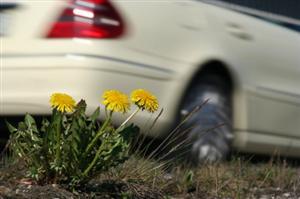| Complexity level: | 5 |
| Project cost ($): | 40 |
| Time required: | 1 hour to prepare, 8 days for the science project experiment |
| Material availability: | Easily found |
| Safety concerns: |
Hypothesis
Gasoline fumes cause plants to die - the longer the exposure to the fumes, the quicker the plants will die. Our second hypothesis is that exposure to fumes, at higher environmental temperatures, will result in quicker death.
Overview
Gasoline
Gasoline is obtained from petroleum in oil refineries, and used as fuel in combustion engines. It is made of over 250 types of hydrocarbons. Aromatic hydrocarbons like toluene and benzene are used to increase the octane rating of gasoline. Other additives are also added to improve engine performance and reduce the emission of harmful gasses formed as byproducts of the combustion process.
Some hydrocarbons found in gasoline like benzene are carcinogenic. These hydrocarbons escape into the air around us while we are refilling petrol at a gas station. They also leak from our petrol tanks and the engine exhaust. About 30% to 50% of the hydrocarbons emitted into our atmosphere are released from vehicles.
The formation of ozone occurs when hydrocarbons react with nitrogen oxides or carbon monoxides in the presence of heat and sunlight. The ozone layer protects our planet from ultraviolet rays. However, the ozone found at ground level causes respiratory problems. It also damages plants, reduces farm yields and affects plant health.
Scientific Terms
Materials
The materials required for this science fair project:
- 4 potted plants of the same size
- 4 transparent aquariums
- 4 ceramic bowls
- 1 liter of gasoline
- a thermometer
- 1 black marker pen
Procedure
1. For this science fair project, the independent variable is the environmental temperature and the length of exposure time. The dependent variable is the color of the leaves and the survivability of the plants. This is determined by observing the plants for 8 days. The constants (control variables) are the size of the bowls containing the gasoline, the type and amount of gasoline used and the size of the aquariums.
2. Four potted plants are required for this experiment. They should be kept in a well lit, cool and airy spot in your garden or balcony for several weeks, allowing the plants to adjust and acclimatize to the surrounding environment. The pots are labeled A to D using the marker pen. Gasoline is poured into the 4 ceramic bowls and placed beside the plants. The 4 aquariums are inverted and used to cover the potted plants and bowls.
3. The 4 plants will be tested under the following conditions :
a. Pot A – covered with the aquarium and placed at room temperature (24 °C) for 3 hours everyday
b. Pot B – covered with the aquarium and placed at room temperature (24 °C) for 6 hours everyday
c. Pot C – covered with the aquarium and placed in the hot sun (34 °C) for 3 hours everyday
d. Pot D – covered with the aquarium and placed in hot sun (34 °C) for 6 hours everyday
4. After procedure 3 is completed, the aquariums and gasoline bowls are removed and the plants returned to their original environments until the next day.
5. The condition of the plants is checked everyday and the observations are recorded in the table given below.
Results
It was observed that the plants that were exposed to gasoline fumes for longer periods of time, and athigher temperatures died more quickly.
| Condition | Condition of the Plants | |||||||
| Day 1 | Day 2 | Day 3 | Day 4 | Day 5 | Day 6 | Day 7 | Day 8 | |
| 3 hours, 24°C | Y | Y | Y | Y | O | O | O | X |
| 6 hours, 24°C | Y | Y | O | O | O | X | X | X |
| 3 hours, 34°C | Y | Y | O | O | O | X | X | X |
| 6 hours, 34°C | Y | O | O | X | X | X | X | X |
Y - potted plant in good condition, O – leaf turning yellow, X – plant is dead (brown and shrivelled)
Conclusion
The hypothesis that longer periods of exposure to gasoline fumes, at higher temperatures will result in quicker death of plants. Gasoline contains aromatic hydrocarbons like benzene that are carcinogenicand harmful to living organisms. Therefore, the occurrence of gasoline leaks are a big threat to public health and the environment. Gasoline is also extremely volatile and will evaporate more quickly at higher temperatures. Many safety factors must be taken into consideration to prevent leakage when designing and building gasoline storage tanks and transportation piping.
Also consider
Repeat the science fair project to study the effect of gasoline vapor on insects.
Alternatively, you could also try to ascertain if certain species of plants are more resilient in the presents of gasoline fumes
References
Gasoline - http://en.wikipedia.org/wiki/Gasoline
Environmental affects of ethanol and gasoline - http://www.sentex.net/~crfa/ethaenv1.html
Avoid evaporating gas - http://planetgreen.discovery.com/tech-transport/avoid-evaporating-gas-shade.html

